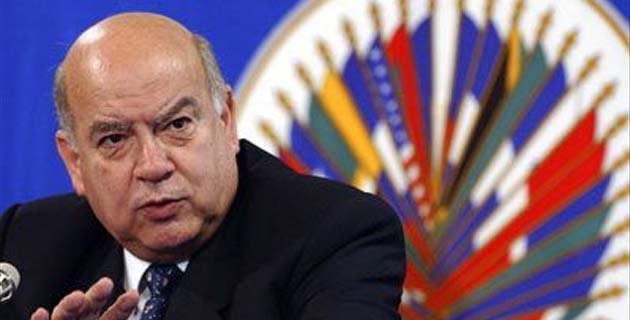Secretary General of the OAS Insulza to Visit Council on Hemispheric Affairs

The Council on Hemispheric Affairs (COHA) is proud to announce that on Thursday, May 30, it will host a discussion with the Secretary General of the Organization of American States (OAS), José Miguel Insulza, to discuss the potential consequences of the April 14 Venezuelan election on the relationship between Venezuela and the United States. The talk will also address the report, “The Drug Problem in the Americas,” which the OAS released on May 22. Secretary Insulza has had a close relationship with COHA and its director, Larry Birns, who said he “has not had a spat with the Secretary General for at least the past 30 years, and thus Insulza is a reformed man,” speaking to their long personal history.
Insulza’s commitment to strengthening democratic governance and protecting human rights throughout the region parallels COHA’s progressive orientation. He last visited COHA in July 2011, and this year’s event will only further solidify his relationship with the organization. COHA Senior Research Fellow and Professor of Philosophy at Bowie State University Frederick B. Mills will moderate the event.
Despite the general approval he has received during his time in office, Insulza has not escaped political controversy as Secretary General of the OAS. In 2007, two years after taking office, he denounced the Venezuelan government’s refusal to renew the transmitting license of an anti-Chávez independent TV broadcasting station, Radio Caracas Television, a move that many saw as overstepping his mandate. Although the late President Hugo Chávez strongly supported Insulza’s candidacy in 2005, when he was initially elected Secretary General, their strained relationship was revealed when Chávez labeled him “an idiot, a true idiot” in response to Insulza’s criticism. Ecuador’s relationship with the OAS under Insulza has also been contentious. In 2012, President Rafael Correa remarked that it was unfair that Cuba was not a part of the organization, and also that the United States had too much influence within it. Accordingly, Ecuador chose not to attend the 6th Summit of the Americas in April 2012 in protest of Cuba’s exclusion. During Insulza’s tenure, both Venezuela and Ecuador have threatened to leave the organization on multiple occasions, undermining the OAS’s ability to come forth with executive initiatives, the strengthening of which has been one of Insulza’s most important contributions to the forum.
The major theme of Insulza’s presentation on Thursday will be the repercussions of the April Venezuelan elections. Nicolás Maduro won the presidential election by 1.6 percent of the vote over Henrique Capriles Radonski of the United Democratic Roundtable (MUD); Capriles is calling for a recount. The National Electoral Council (CNE), which oversaw the elections in the presence of more than 170 international observers, and conducted an audit of the results, has a solid record. However, the Obama administration continues to support Capriles and the Venezuelan opposition’s refusal to recognize Maduro as president. In contrast, most nations recognize that the elections were free and fair, and UNASUR and the Secretary General of the OAS himself have extended their recognition to Maduro. Insulza’s recognition serves as a testament to his integrity and leadership in the OAS.
The second theme of Insulza’s visit to COHA is his views of the OAS report on the inter-American drug problem. The report is significant because it broadens the consideration of the drug problem beyond law enforcement to incude a discussion of drug abuse as a public health concern as well. COHA looks forward to an informative and lively discussion of these themes and other hemispheric themes when it hosts Insulza on Thursday.
Isabella Fabens and Rebecca Lullo, Research Associates at the Council On Hemispheric Affairs
Please accept this article as a free contribution from COHA, but if re-posting, please afford authorial and institutional attribution. Exclusive rights can be negotiated.
For additional news or analysis on Latin America, please go to: Latin News and Rights Action
References
[1] Mokhtari, Nicki and Larry Birns. “Hugo Chávez, the Media and Everybody Else.” Council on Hemispheric Affairs. January 19, 2007. https://coha.org/hugo-chavez-the-media-and-everybody-else/.
[2] Birns, Larry. “Post-Election Conflict in Venezuela and the Hemispheric Response.” Council on Hemispheric Affairs. April 18, 2013. https://coha.org/22316/.

